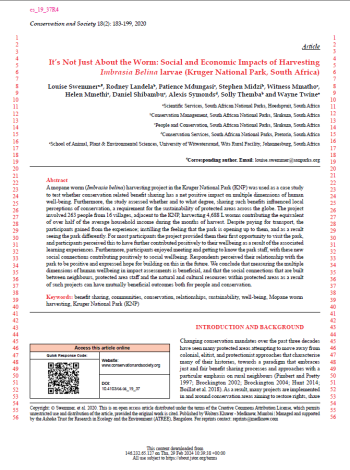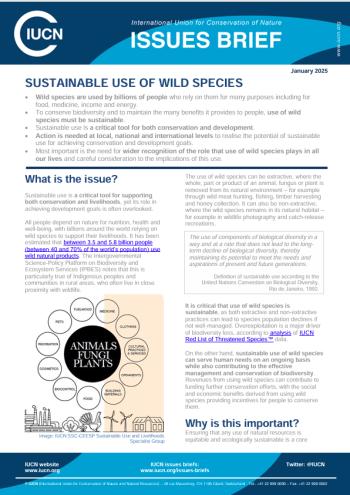

It’s Not Just About the Worm: Social and Economic Impacts of Harvesting
A mopane worm (Imbrasia belina) harvesting project in the Kruger National Park (KNP) was used as a case study to test whether conservation related benefit sharing has a net positive impact on multiple dimensions of human well-being. Furthermore, the study assessed whether and to what degree, sharing such benefits influenced local perceptions of conservation, a requirement for the sustainability of protected areas across the globe. The project involved 263 people from 16 villages, adjacent to the KNP, harvesting 4,688 L worms contributing the equivalent of over half of the average household income during the months of harvest. Despite paying for transport, the participants gained from the experience; instilling the feeling that the park is opening up to them, and as a result seeing the park differently. For most participants the project provided them their first opportunity to visit the park, and participants perceived this to have further contributed positively to their wellbeing as a result of the associated learning experiences. Furthermore, participants enjoyed meeting and getting to know the park staff, with these new social connections contributing positively to social wellbeing. Respondents perceived their relationship with the park to be positive and expressed hope for building on this in the future. We conclude that measuring the multiple dimensions of human wellbeing in impact assessments is beneficial, and that the social connections that are built between neighbours, protected area staff and the natural and cultural resources within protected areas as a result of such projects can have mutually beneficial outcomes both for people and conservation.
-
Alexis Symonds
-
Daniel Shibambu
-
Helen Mmethi
-
Louise Swemmer
-
Patience Mdungasi
-
Rodney Landela
-
Solly Themba
-
Stephen Midzi
-
Wayne Twine
-
Witness Mmatho
We support the free flow of information. Please share:
Form coming soon
Related Content
-

-

Review of African Social and Economic Development Volume 1
ByIbrahim Bàbátúndé Anobaarrow_forward2024 -

Economic Analysis: Climate Change and Wildlife Utilization on Private Land
ByJackson OtienoEdwin Muchapondwaarrow_forward2015
Get updates by email
Through impactful research, stakeholder engagement, and professional development, AWEI is supporting the wildlife economy across Africa. Please subscribe for occasional updates on our work and forthcoming events.
Sign up for a quarterly dose of AWEI insights
In a complex and changing world, AWEI generates strategic ideas, conducts independent analysis on wildlife economies, and collaborates with global scholar-practitioners to provide training and expertise for biodiversity conservation, climate resilience, and inclusive economic opportunities in Africa.
